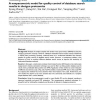Free Online Productivity Tools
i2Speak
i2Symbol
i2OCR
iTex2Img
iWeb2Print
iWeb2Shot
i2Type
iPdf2Split
iPdf2Merge
i2Bopomofo
i2Arabic
i2Style
i2Image
i2PDF
iLatex2Rtf
Sci2ools
BMCBI
2008
2008
A nonparametric model for quality control of database search results in shotgun proteomics
Background: Analysis of complex samples with tandem mass spectrometry (MS/MS) has become routine in proteomic research. However, validation of database search results creates a bottleneck in MS/MS data processing. Recently, methods based on a randomized database have become popular for quality control of database search results. However, a consequent problem is the ignorance of how to combine different database search scores to improve the sensitivity of randomized database methods. Results: In this paper, a multivariate nonlinear discriminate function (DF) based on the multivariate nonparametric density estimation technique was used to filter out false-positive database search results with a predictable false positive rate (FPR). Application of this method to control datasets of different instruments (LCQ, LTQ, and LTQ/FT) yielded an estimated FPR close to the actual FPR. As expected, the method was more sensitive when more features were used. Furthermore, the new method was shown to...
| Added | 09 Dec 2010 |
| Updated | 09 Dec 2010 |
| Type | Journal |
| Year | 2008 |
| Where | BMCBI |
| Authors | Jiyang Zhang, Jianqi Li, Xin Liu, Hongwei Xie, Yunping Zhu, Fuchu He |
Comments (0)

